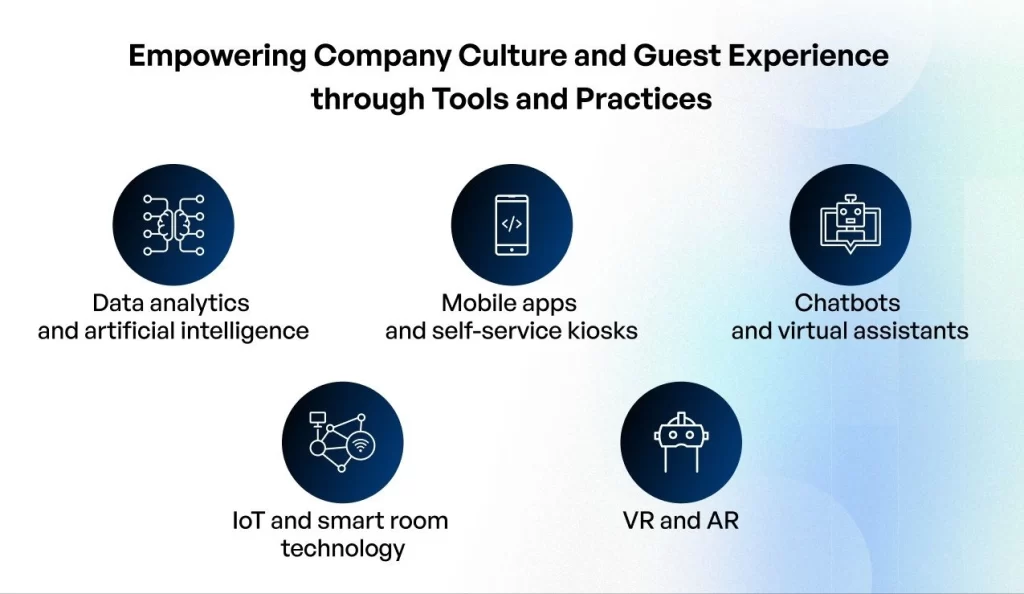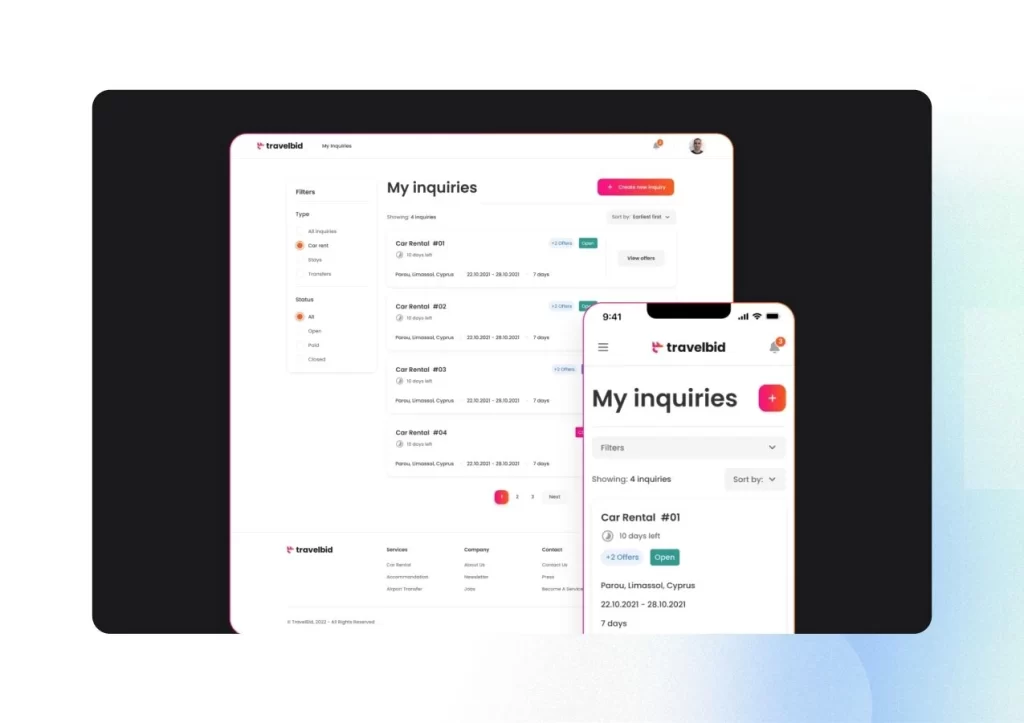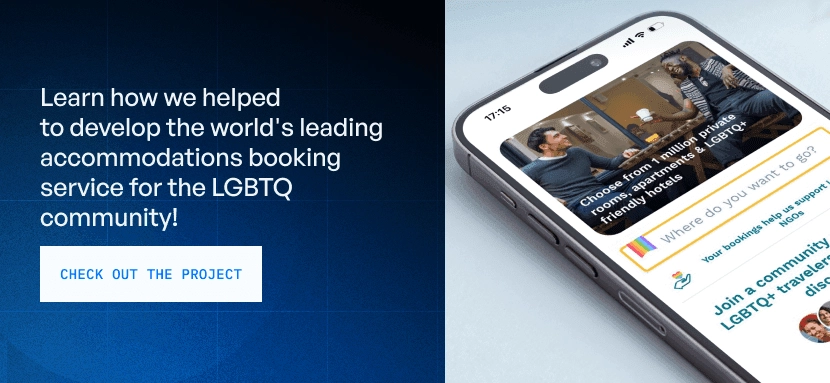The Tech Advantage: Transforming Company Culture and Ensuring Guest Wow in Your Hospitality Business

As more people seek outstanding service, the pressure to deliver exceptional experiences in the hospitality industry is higher than ever. However, there’s a problem – there aren’t enough workers available, putting a cloud over the industry’s potential. To make matters more complex, many employees are leaving their jobs.
These challenges have sparked a significant change, leading the industry to see technology not just as a solution but as a strategic partner in nurturing a vibrant company culture and providing exceptional guest experiences.
Based on our extensive experience developing travel software, we explore how technology plays a crucial role in long-term success within an industry that manages the delicate balance between demand and workforce dynamics. We shed light on the transformative potential of technology, showing its essential role in shaping the core of hospitality in the modern era.
Keep reading to discover more!
Table of contents
- Key Challenges Facing Hoteliers and How Technology Can Solve Them
- Innovative Technologies Transforming The Hospitality Industry: Use Cases
- How Alternative Spaces Can Help Leverage Technologies for Your Hospitality Business
- Summing Up
- FAQ
Key Challenges Facing Hoteliers and How Technology Can Solve Them
Navigating the complexities of the hospitality industry, encompassing evolving consumer expectations and the intricacies of managing a workforce, is essential for success in this dynamic sector. Fortunately, innovative tools and technologies provide solutions that drive the industry toward enhanced efficiency and heightened guest satisfaction.
Let’s consider this in more detail.
Labor shortages and workforce management
Labor shortages and workforce management are prevalent challenges in the hospitality sector. The hospitality industry experiences a turnover rate significantly above the average. The Bureau of Labor Statistics recorded 18% and 27% more separations than new hires, respectively, despite job openings maintaining a consistent level.
The industry consistently needs to work on maintaining a sufficient and qualified workforce, leading to operational disruptions and impacting service quality. The complexities of managing staffing levels, addressing turnover, and ensuring a skilled and engaged team are recurrent issues that demand strategic solutions within the hospitality landscape.
Tech solution. Workforce management tools powered by artificial intelligence can optimize scheduling, streamline recruitment processes, and provide valuable insights for talent retention. Automated systems ensure optimal staffing levels, minimizing the impact of labor shortages on service quality.
Guest experience personalization
A recent survey gathered insights from hoteliers across Asia, Europe, and North America, focusing on the primary motivations behind their technology adoption. The survey found that the main reason, cited by most respondents at 24 percent, was to enhance the guest experience.
Meeting modern guests’ diverse and personalized expectations is an ongoing challenge in the hospitality sector. With evolving preferences and unique requirements, relying on one-size-fits-all approaches is becoming increasingly outdated. Guests today seek individualized experiences, and the industry is tasked with adapting to this shift by embracing innovative and tailored service offerings to cater to the diverse needs of its clientele.
Tech solution. Customer relationship management (CRM) systems, data analytics, and artificial intelligence enable hotels to gather and analyze guest preferences. This information facilitates personalized services, from customized room amenities to targeted promotions, ensuring a memorable and tailored experience for each guest.
Read Also: Automation in travel industry
Operational inefficiencies
Relying on manual processes and outdated systems frequently results in operational inefficiencies within hotel management. These antiquated methods can hinder productivity and compromise the agility of hotel operations. The need for constant manual intervention consumes time and leaves room for errors, preventing the seamless flow of tasks.
Tech solution. Integrated property management systems (PMS) and advanced point-of-sale (POS) systems automate check-ins, check-outs, and inventory management tasks. Cloud-based solutions enhance accessibility and collaboration, ensuring a streamlined and efficient operation.
Revenue optimization
One of the foremost challenges the hospitality sector faces is the intricate task of revenue optimization. Maximizing revenue streams requires balancing pricing strategies, demand forecasting, and adapting to the ever-changing market dynamics. With fluctuating demand, seasonal variations, and diverse booking channels, hoteliers face the ongoing challenge of ensuring rooms are priced competitively while maximizing profitability.
Tech solution. Technology enables hoteliers to navigate the complexities of fluctuating demand and dynamic market conditions by leveraging dynamic pricing algorithms, data analytics, and channel management systems. Advanced systems provide real-time insights into competitor pricing, historical booking patterns, and market trends, allowing for precision in adjusting room rates to align with demand fluctuations. The integration of artificial intelligence augments decision-making by identifying subtle patterns in vast datasets, ensuring more informed pricing strategies.
Property maintenance and standards
Ensuring a property meets and exceeds the expected cleanliness, safety, and overall condition standards is complex. The industry’s dynamic nature, with constant guest turnover and diverse facilities, demands meticulous attention to detail in maintaining the physical infrastructure and high service standards. Balancing routine maintenance, addressing wear and tear, and promptly responding to unforeseen issues pose ongoing challenges for hoteliers and property managers.
Tech solution. Integrating smart technologies, such as sensors and the Internet of Things (IoT), enables real-time monitoring of facilities and equipment, allowing for predictive maintenance. Computerized Maintenance Management Systems (CMMS) streamline the scheduling and tracking of maintenance tasks, ensuring a proactive and organized approach to property upkeep.
As you can see, technology emerges as a dynamic force driving positive change within the hospitality industry. Innovative tools overcome obstacles, deliver unparalleled guest experiences, and ensure long-term success.
Innovative Technologies Transforming The Hospitality Industry: Use Cases
Ensuring an outstanding guest experience requires strategically optimizing workforce management and guest interactions. Innovative tools and practices play a pivotal role in achieving this goal. Here are several ways in which these tools and practices contribute to enhancing company culture and guest experience:

Data analytics and artificial intelligence
Such tech trend as data analytics and artificial intelligence enhances the hospitality industry’s company culture and guest experiences. For staff, it fosters a positive work environment, continuous learning, and efficient collaboration. For guests, it translates into personalized services, streamlined processes, and memorable stays, ultimately setting a higher standard for excellence in the industry.
Here’s a closer look at how these technologies foster a positive company culture with data and AI:
- Employee engagement platforms. Organizations can use data analytics to gauge employee satisfaction, collaboration patterns, and individual preferences. According to a survey by Hospitality Technology, 86% of hotels express confidence in the capacity of data analytics to increase revenue, with an additional 77% believing in its potential to improve guest satisfaction.
AI-driven platforms then provide tailored recommendations for team-building activities, recognition initiatives, and personalized professional development opportunities, fostering a positive and engaging company culture.
- Learning development software. AI analyzes individual performance metrics and learning styles, enabling the customization of training programs. Data analytics tracks skill development, providing insights into staff strengths and areas for improvement. This ensures continuous growth and empowerment within the workforce.
- Employee feedback and recognition tools. AI algorithms decode employee feedback sentiments, identifying trends and patterns. Recognition tools using AI offer real-time acknowledgments for outstanding performance, cultivating a culture of appreciation and boosting overall morale.
- Communication and collaboration software. Data analytics assesses team communication patterns, revealing strengths and areas for improvement. AI-powered collaboration tools then streamline communication, fostering a cohesive work environment where staff members can efficiently collaborate regardless of their roles.
Here are some use cases of how you can elevate the guest experience through personalization:
- Predictive analytics for personalized experiences. AI analyzes historical guest data to predict preferences and behaviors. Leveraging this insight, hotels can offer personalized recommendations for room amenities, dining options, and local experiences, creating a unique and tailored stay for each guest.
- AI-powered virtual concierge. AI-driven virtual concierge services instantly respond to guest inquiries, offering recommendations and personalized suggestions based on past interactions. This ensures a seamless and customized experience, enhancing overall guest satisfaction.
Example of a digital concierge powered by AI
- Dynamic pricing and revenue management. Data analytics and AI optimize pricing strategies based on demand fluctuations and external events. Guests benefit from personalized promotions and dynamic pricing, ensuring they receive optimal value during their stay.
AI-powered revenue management
- Contactless services and technologies. AI and data analytics enable the implementation of contactless services such as mobile check-ins, keyless entry, and QR code menus. This enhances safety and provides a convenient and frictionless experience for guests.
- Guest relationship management (GRM) systems. GRM systems powered by AI consolidate guest interactions, preferences, and feedback. This wealth of information allows for highly personalized services, from room setups to special requests, creating a memorable and individualized stay.
Read also: How to Create a Booking Website for Travel and Hospitality Businesses
Mobile apps and self-service kiosks
In an era where technology seamlessly integrates into our daily lives, mobile apps and self-service kiosks have emerged as transformative tools in the hospitality industry. Beyond simplifying processes, these innovations are pivotal in shaping company culture and elevating guest experience.
Here’s an exploration of the profound impact these technologies have on company culture:
- Streamlined work processes. Mobile apps equipped with task management functionalities empower staff to streamline workflows. From housekeeping assignments to room service requests, these apps enhance efficiency, allowing staff to focus on delivering exceptional guest experiences rather than navigating cumbersome processes.
- Instant communication. Mobile communication platforms facilitate real-time communication among staff members. Whether coordinating room turnovers or addressing guest requests, instant communication ensures a synchronized and responsive team, fostering a positive and collaborative company culture.
- Recognition and rewards. Mobile apps can incorporate recognition features, allowing colleagues and management to acknowledge and reward exceptional performance. This fosters a culture of appreciation, motivating staff to excel in their roles and creating a positive work environment.
Read also: How to create a mobile booking app in 2024 [+ Free Guide]
Below, we consider use cases of how you can enhance guest experience through mobile Apps and kiosks:
- Seamless check-in and check-out. Mobile apps enable guests to check in and out seamlessly, reducing wait times and enhancing convenience. Additionally, self-service kiosks in lobbies provide a quick and efficient alternative, allowing guests to manage their arrival and departure independently.
Mobile check-in service for hotels
- Personalized services. Mobile apps allow guests to customize their stay preferences, from room configurations to in-room amenities. This personalization creates a tailored experience, contributing to heightened satisfaction and a positive perception of the hotel’s commitment to guest comfort.
- Contactless services. Mobile apps and self-service kiosks support contactless services such as mobile room keys and digital menus. In a post-pandemic landscape, these features enhance safety and provide guests with a seamless and hygienic experience during their stay.
- Concierge services at fingertips. Mobile apps act as virtual concierges, offering recommendations for local attractions, dining options, and services. This instant access to information empowers guests to make informed decisions, enhancing their experience and satisfaction.
Chatbots and virtual assistants
The integration of chatbots and virtual assistants has ushered in a new personalized and efficient service delivery era. Beyond their operational benefits, these AI-driven technologies significantly shape a positive company culture and enhance the guest experience.
Let’s delve into the transformative impact these digital assistants have on employees and company culture:
- Streamlined internal communication. Virtual assistants can streamline internal communication processes. Staff members can use voice-activated assistants for quick updates, task assignments, and even accessing policy information, fostering efficient collaboration and a positive work environment.
- Employee onboarding and training. Chatbots facilitate employee onboarding by responding instantly to common queries about company policies, benefits, and training materials. This ensures a smooth transition for new hires, contributing to a culture of support and clarity.
- Recognition and rewards. Chatbots integrated with recognition features allow employees to receive instant acknowledgment for their achievements. Whether it’s reaching milestones or exceptional service, these virtual assistants contribute to a culture that values and celebrates individual and team accomplishments.
- Feedback and improvement. Chatbots can collect feedback from staff regarding their work experiences, providing a channel for constructive criticism and suggestions. This continuous feedback loop fosters a culture of improvement and shows that employee voices are valued.
Now, let’s consider how chatbots and virtual assistants can transform the guest experience:
- Instant customer service. Chatbots instantly respond to guest inquiries, providing information about hotel facilities, services, and local attractions. This ensures guests receive prompt assistance, enhancing their experience and satisfaction.
- Personalized recommendations. AI-driven virtual assistants analyze guest preferences and behaviors, offering personalized dining, activities, and amenities recommendations. This tailored approach creates a unique and memorable experience for each guest.
- Contactless services. Virtual assistants support contactless services, allowing guests to make service requests, order room service or even control room features through voice commands.
- Reservation and booking assistance. Chatbots assist guests in making reservations, providing real-time availability updates, and guiding them through booking. This ensures a seamless and user-friendly experience for potential guests.
- Voice search. This technology has emerged as a transformative force in the hotel industry, revolutionizing how guests interact with hotels and enhancing user experience. This technology leverages natural language processing and voice recognition to enable users to perform searches, make requests, and obtain information using voice commands.
A demonstration of hotel search by voice
IoT and smart room technology
The IoT and smart room technology have emerged as groundbreaking innovations, redefining operational efficiency and significantly impacting company culture and guest experience.
Let’s explore the various ways in which these technologies are reshaping the hospitality sector for employees:
- Streamlined operations and workflow. IoT sensors integrated into hotel facilities optimize operational workflows. From predictive equipment maintenance to automated inventory tracking, staff can focus on providing exceptional service rather than grappling with manual tasks, fostering a culture of efficiency.
- Real-time communication and collaboration. IoT-enabled communication platforms ensure real-time coordination among staff members. From housekeeping to maintenance, staff can seamlessly communicate and collaborate, contributing to a cohesive work environment and positive company culture.
- Employee well-being and safety. Wearable IoT devices can monitor staff well-being and safety. These devices can track physical activity, ensure safe working conditions, and provide alerts in case of emergencies, demonstrating a commitment to employee welfare and fostering a culture of care.
Now, we consider how IoT and smart room technology enhance guest experience:
- Personalized room environments. IoT sensors in smart rooms allow guests to personalize their environments. From adjusting lighting and climate control to setting preferences for entertainment systems, guests experience a heightened sense of control, contributing to overall satisfaction.
- Seamless check-in and keyless entry. IoT-based mobile apps streamline check-in processes, allowing guests to bypass traditional reception. Keyless entry systems enhance security and provide guests with a seamless and convenient arrival experience.
- In-room smart assistants. Smart room technology often includes virtual assistants that respond to voice commands. Guests can use these assistants to access information, request services, or control in-room amenities, offering a futuristic and intuitive experience.
Virtual Reality (VR) and Augmented Reality (AR)
In a world where digital innovation increasingly defines experiences, VR and AR are transformative technologies with immense potential in the hospitality industry.
Let’s explore different ways you can foster a tech-forward company culture with VR and AR:
- Virtual training and onboarding. VR facilitates immersive training experiences for staff members. From learning about standard operating procedures to simulating real-world scenarios, employees can undergo onboarding processes in a virtual environment, ensuring they are well-prepared for their roles.
- Collaborative design and planning. AR enables collaborative design and planning sessions for staff involved in event management or room layout. Teams can visualize and make real-time adjustments, fostering a culture of creativity and efficient collaboration.
- Virtual team-building activities. VR platforms offer opportunities for virtual team-building activities. Staff members, even if geographically dispersed, can engage in shared experiences, enhancing camaraderie and contributing to a positive and connected company culture.
- Remote assistance through AR. AR applications provide remote service, allowing staff members to receive real-time guidance. Whether troubleshooting technical issues or conducting maintenance tasks, AR fosters a culture of support and knowledge-sharing.
Here is how you can elevate your guest experience through immersive realities:
- Virtual property tours. VR offers virtual property tours, allowing potential guests to explore accommodations and facilities remotely. This immersive experience aids in decision-making, enhancing the pre-stay experience and setting the stage for an anticipated visit.
Example of 360 virtual tours for a hotel
- Augmented menus and room information. AR applications enhance the dining experience by overlaying digital information on physical menus. Guests can view images, nutritional information, or even virtual presentations of dishes, adding a layer of engagement and personalization.
Restaurant menu in augmented reality
- AR wayfinding and navigation. AR assists guests in navigation within the hotel premises. Guests can easily find their way around by superimposing directions and points of interest on their mobile screens, creating a seamless and stress-free experience.
- Immersive entertainment experiences. VR offers immersive entertainment options in guest rooms. From virtual concerts to interactive experiences, guests can enjoy personalized entertainment, adding an extra layer of enjoyment to their stay.
The transformative power of technology in hospitality goes beyond mere operational efficiencies. It reshapes the essence of hospitality, creating a dynamic synergy between a positive company culture and elevated guest experiences. The industry is expected to continue embracing innovative technologies to stay competitive and meet the evolving expectations of modern travelers.
How Alternative Spaces Can Help Leverage Technologies for Your Hospitality Business
Alternative Spaces is your strategic partner, offering a wealth of experience and expertise in leveraging transformative technologies. With a robust background in the travel industry, we specialize in harnessing various technologies to propel your hospitality business to new heights.
Our AR and VR development mastery revolutionizes customer experiences, effortlessly turning the mundane into state-of-the-art, interactive products that engage and immerse.
For example, our team implemented a vital functionality that allows taking users to a virtual world where Banská Štiavnica is a living town comprising many innovative and immersive scenes, exhibitions, and historical items. The main goal was to demonstrate important historical events of Banská Štiavnica. That’s why we paid great attention to creating 3D environments and characters.

How Alternative Spaces transformed the historical tour of Banská Štiavnica with VR implementation
As providers of machine learning development services, we empower organizations to unlock groundbreaking solutions, drive impactful business outcomes, and stay ahead in an ever-evolving market. By harnessing the power of machine learning, our services bring insights, enhance decision-making, and pave the way for breakthrough results.
Furthermore, our extensive expertise in travel booking service development is exemplified by TravelBid.com — an innovative platform tailored for travelers in Cyprus.

Alternative Spaces’s experience in building a travel booking system
This platform enables users to effortlessly secure exclusive deals and personalized offers, allowing local travel and hospitality businesses to present special deals during periods of low demand without compromising market-average pricing on popular booking engines such as Booking.com or Expedia.
With Alternative Spaces at your side, your hospitality business is poised for a technological transformation that not only meets but exceeds the expectations of modern travelers!
Summing Up
In the fast-paced world of hospitality, where seamless experiences and personalized service are paramount, the conclusion is clear: the strategic integration of technology is not just a trend but an imperative for sustained success.
Adopting innovative tools and practices is the driving force for enhanced company culture and unparalleled guest experiences. From optimizing workforce management to redefining guest interactions through AR, VR, mobile solutions, AI, and machine learning, technology serves as a powerful tool.
Nowadays, the hospitality industry has the opportunity to redefine standards, setting new benchmarks for efficiency, personalization, and excellence as a whole.
If you have any inquiries or require assistance, the Alternative Spaces team will gladly help you in leveraging technology for your hospitality business needs.
FAQ
- What innovative tools can improve workforce management in hospitality?
Tools such as workforce optimization software, AI-driven scheduling, and employee management platforms can significantly enhance workforce management in the hospitality sector. These solutions streamline processes, optimize staffing levels, and improve operational efficiency.
- Can technology contribute to sustainability in the hospitality sector?
Absolutely. Such hospitality technology trends as smart energy management systems, IoT sensors, and eco-friendly practices enabled by technology contribute to sustainability efforts in the hospitality sector. Businesses can reduce their environmental footprint while meeting modern sustainability expectations.
- How does tech innovation contribute to personalized guest experiences?
Technology contributes to personalized guest experiences by leveraging data analytics, mobile apps, chatbots, AR/VR, personalized messaging, and IoT devices. These tools allow hotels to understand guest preferences, offer customized services, and create immersive and tailored interactions, ultimately enhancing the overall guest experience.
- Can technology assist in managing high turnover rates in the hospitality industry?
Certainly, technology can be a valuable ally in managing high turnover rates in the hospitality industry. By leveraging the latest hospitality technology trends such as onboarding apps, virtual training modules, and employee engagement platforms, businesses can streamline the onboarding process, improve training efficiency, and enhance employee satisfaction, increasing retention rates.
- How can Alternative Spaces help businesses leverage technology trends in hospitality?
Alternative Spaces can assist businesses in the hospitality industry by leveraging its expertise in various technologies. By implementing cutting-edge hospitality technology, Alternative Spaces helps companies optimize workforce management, implement personalized guest interactions, and stay ahead of industry trends, ultimately driving efficiency and innovation in the hospitality sector.
Content created by our partner, Onix-systems.
Source: https://onix-systems.com/blog/hospitality-tech-trends-culture-engagement Home
Home

